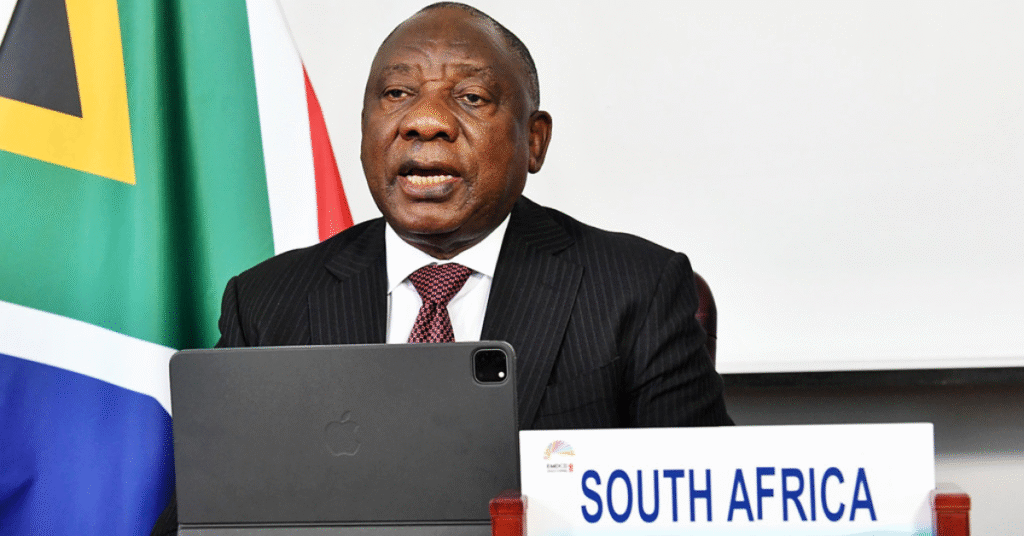South Africa is investigating reports that 17 of its citizens were tricked into joining mercenary groups in eastern Ukraine, officials said Thursday.
President Cyril Ramaphosa’s office got distress calls from men aged 20 to 39 who said they were “lured to join mercenary forces in the Ukraine–Russia war under the pretext of lucrative employment contracts.”
The men are now stranded in the Donbas region and have asked for help to return home. Authorities are working to confirm who they are, find out how they were recruited, and arrange for their safe return.
Recruited Under False Promises
While officials have not confirmed which side the men fought for, their presence in Donbas — territory largely controlled by Russia — and the description of deceptive job offers suggest they were likely recruited by Russian-linked networks.
Government spokesperson Vincent Magwenya called the case “deeply troubling” and said it shows how foreign groups take advantage of vulnerable young people through fake online job ads.
“The President has directed law-enforcement and intelligence agencies to investigate the circumstances under which these individuals were recruited and transported to a war zone,” Magwenya said in a statement.
Under South African law, citizens are prohibited from rendering foreign military service without authorization. Violations of the Regulation of Foreign Military Assistance Act of 1998 can result in severe penalties.
Foreign Recruitment in the Russia–Ukraine War
This news adds to the growing evidence that recruiters are targeting people from Africa, Asia, and Latin America as the war enters its fourth year.
A Reuters report says both Moscow and Kyiv have looked for foreign support, but Russia’s efforts have been much wider and often use pressure and deception.
The Guardian and AP News have reported cases where African nationals were promised construction or security jobs abroad, but ended up being sent to fight in Ukraine.
In September, Ukraine’s military released footage of a captured Kenyan fighter who said he had been tricked into fighting for Russian units after answering an online advertisement.
Ukraine’s Center for Countering Disinformation, a state agency, said in October that Russia started new mercenary recruitment campaigns in Africa, Southeast Asia, and Latin America, offering high pay for non-combat jobs that were actually military positions.
Analysts Warn of Growing Trend
Military experts say foreign fighters are a small part of the total forces, but their symbolic impact is important, especially in propaganda and recruitment stories.
“The role of foreign fighters on both the Ukrainian and Russian sides has increased over the last two years,” said Franz-Stefan Gady, a senior fellow at the International Institute for Strategic Studies.
“But in terms of numbers, they are still few. Their main value is psychological, showing that this war goes beyond national borders.”
Jethro Norman, a senior researcher at the Danish Institute for International Studies, added that foreign fighters “punch far above their weight” in online stories. In the war, volunteers symbolized solidarity with Ukraine. Now, Russian networks use similar imagery to draw recruits from abroad,” he said.
South Africa’s Response and Legal Path
Officials said the government is working with foreign embassies and international agencies to find and bring home the 17 citizens. Department of International Relations and Cooperation (DIRCO) has also warned South Africans against responding to suspicious overseas job advertisements or military recruitment drives on social media.
South Africa has maintained a neutral diplomatic stance in the Russia–Ukraine conflict, calling for peace talks and restraint. However, the discovery that its citizens were deceived into participating in the war has placed Pretoria in a sensitive international position.
“This case raises moral, legal, and diplomatic questions for South Africa,” said political analyst Ralph Mathekga.
“It exposes how global conflicts exploit economic desperation — and how African countries need stronger safeguards to protect citizens from being drawn into wars abroad.”
A Broader Global Concern
The issue of coerced or deceptive foreign recruitment extends beyond Africa. Reports from Ukraine, the UK, and human rights groups indicate that Nepalese, Syrian, Cuban, and North Korean nationals have also been deployed to fight for Russia, sometimes under state-linked arrangements.
Meanwhile, Ukraine continues to allow foreign volunteers to enlist formally through its International Legion, which has included fighters from Europe, the United States, and Latin America.
The Ukrainian government maintains that it does not recruit mercenaries but permits foreigners to join as regular soldiers under contract.
An Unfolding Investigation
For South Africa, the focus remains on uncovering how its citizens were approached, who arranged their travel to the Donbas region, and whether larger criminal networks are operating within the country.
Authorities have yet to disclose the men’s current locations or the timeline of their return.
The Presidency said updates will be provided once “credible and verifiable information” becomes available.

